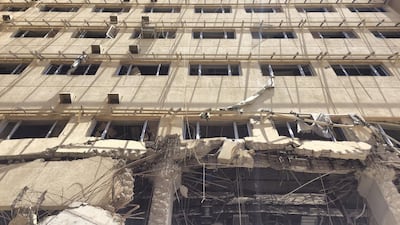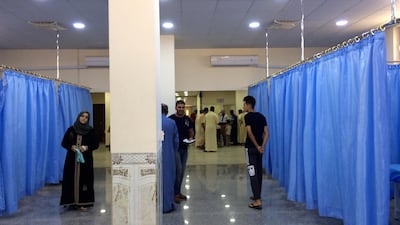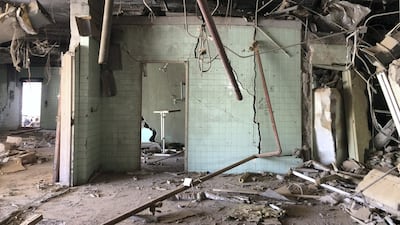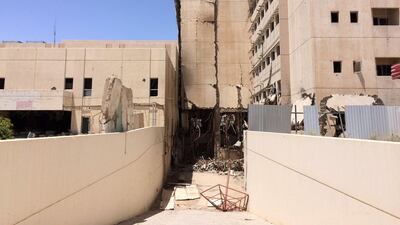Not far from the banks of Iraq’s winding Euphrates River, in one of Ramadi’s northern neighbourhoods, the city’s general hospital looms over the surrounding sand-coloured homes, wrecked and unfit for use.
It’s been over two years since the Iraqi military recaptured the capital of Anbar province from ISIS in a gruelling battle that levelled huge parts of the city. The liberation was hailed as a major victory for the central government, but today homes still lie in ruins, roads are punctured by craters, and basic services like water and electricity are largely nonexistent. The hospital did not escape the devastation.
In 2016 the UN described the destruction in Ramadi as “staggering”, following their first assessment of the newly liberated city.
During their time in Ramadi, ISIS members commandeered the hospital, where they treated their wounded fighters. Some local doctors operated on patients in their own homes, including a surgeon who said he carried out an appendectomy without anesthesia, using only painkillers and sedatives.
Before losing the city in February 2016, the militants detonated explosives causing three of the hospital's six floors to collapse on top of each other. A huge fissure cuts through one of the external walls, leaving the building teetering on the verge of collapse.
On the charred ground floor, where minor surgeries were once carried out, medical equipment lies strewn on the ground and twisted metal rebar pierces the ceilings. The building has yet to be inspected for IEDs and booby traps.
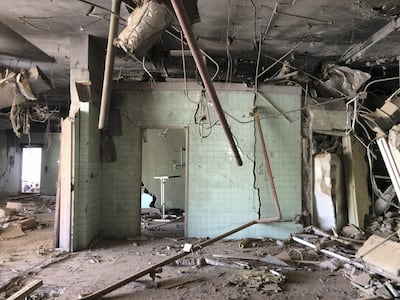
In a region of Iraq where widespread uncertainty about the future and the threat of a resurgent ISIS is ever present, a crippled health-care system has left many Anbaris wanting for basic treatments.
“Nothing has been fixed in the main building,” said Chief of Staff Dr Mazin Al Dulaimy, sitting in one of the offices of the temporary emergency department.
Medical units that once were housed in the devastated hospital now fit uneasily in prefabricated cabins and buildings meant as accommodation for single male doctors.
“We’ve had different organisations visit and received donations from Kuwait – but nothing major,” explained Dr Al Dulaimy. “Since the main building was destroyed, the doctors’ apartments changed into the departments for medicine and surgery but they are not qualified to be CCU and ICUs,” he said referring to the coronary care and intensive care units.
Deemed less essential, the burns department has been transformed into a surgery unit. As a result, burns patients face travelling to Baghdad for treatment – a two-hour drive that often takes much longer due to delays at security checkpoints.
Sometimes, says Dr Al Dumaily, patients die waiting for treatment. Last month a man was injured when a sticky bomb was placed on the underside of his car and detonated. “The patient died because we didn’t have time to transfer him to Baghdad.”
_________
Read more:
In post-ISIS Iraq, tribal justice grows in shadow of Baghdad mistrust
Displaced Iraqis return to destruction and death ahead of elections
_________
Before ISIS, Ramadi’s hospital had 446 bed spaces available, today they can only accommodate 200 patients and are the only hospital in the region with a CT scan machine. "For surgery we have more than 30 patients every single day,” said Dr Al Dumaily.
On the first day of Eid, they received 300 patients in one day. Some 50 kilometres east of Ramadi, the equally overburdened and less-equipped Fallujah hospital often refers patients, further overwhelming Ramadi's hospital.
Outside the office, the hustle and bustle of people resounds through the lobby where flimsy blue curtains separate patients from visitors.
“The problem is that this is a general hospital, so the whole region counts on us,” said Dr Al Dulaimy.
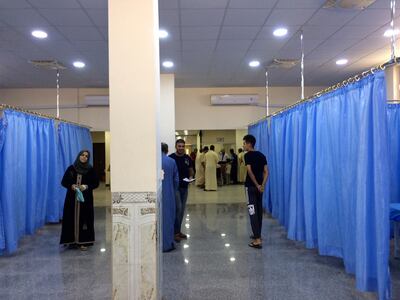
The heavy patient load is exacerbated by a shortage of staff. The orthopaedic unit is manned by one resident doctor and a general practitioner from the government Health Department who agreed to volunteer temporarily.
“I work four continuous days, 24 hours a day,” said twenty-eight-year-old resident orthopaedic Dr Ahmed Hamud.
Young educated doctors have already left Iraq, while many more are planning to do so soon.
Resident surgeon Mostafa Saleh, 28, wants to relocate to Sudan. “I am quite frustrated to be here,” said Dr Saleh. “We don’t do much to help because we are limited, we don’t have a building fit for a hospital.”
According to the young doctor, the Ministry of Education is demanding a payment of $150,000 (Dh550,800) in order to release their doctoral certificates. This, he says, is a government strategy to keep young medical residents from leaving the country and mitigate Iraq’s ongoing brain drain.
Dr Saleh is disillusioned with the rundown system. The hospital, he says, is only taking emergency cases. “We’re in the centre of the province and have too many cases.”
Medication is also scarce, with not nearly enough drugs making it through Al Suqoor, the checkpoint that links Anbar province to Baghdad. Despite Iraq’s free healthcare system, doctors often have to ask their patients to purchase their own medication, which some can't afford.
Al Suqoor is manned by members of the Iraqi military and the Popular Mobilisation Forces – an umbrella organisation which includes a number of Iran-backed Shiite militia groups. Anbaris say they are being punished by the central government, who they say blames the Sunni-majority province for the rise of ISIS. Fallujah, Anbar’s second largest city, was the first in Iraq to be overrun by the militant group in December 2013.
“The medicine should be coming from the Ministry of Health,” explained one young doctor in charge of the hospital pharmacy. But basic drugs like aspirin, hydrocortisone and tramadol are not readily available.
__________
Read more:
Opinion: What lies ahead when ISIL is finally defeated?
Iraq year in review: the country may be free of ISIL but lies in ruins
_________
Hadi Muslah lies in the dark in one of the makeshift patient rooms in what was once a doctors’ residency. In her 50s, she has been diagnosed with an irregular heartbeat only to find that the hospital was out of the drugs she needed.
“It cost me $50, I borrowed money to buy the drugs,” she says. “I can’t continue taking them as I don’t have the financial capability. But if I don’t take drugs this condition will continue.”
With Ramadi residents facing social, political and financial challenges, the slow reconstruction of the hospital exacerbates these existing problems.
As is often the case with so many of Iraq’s ills, some cite corruption as the main problem.
“People are stealing and they are highly organised,” said one doctor, asking that his name not be used. “The former head of the hospital told me there is an organisation, they’re inside the hospital and the Ministry of Health, but he can’t control them so he quit.”
